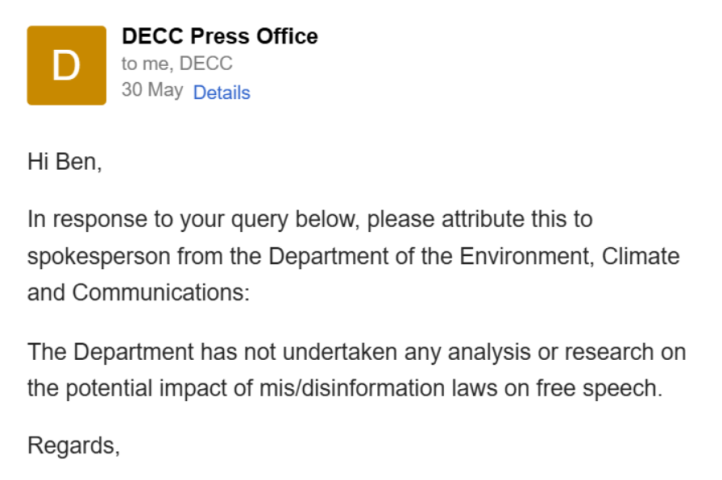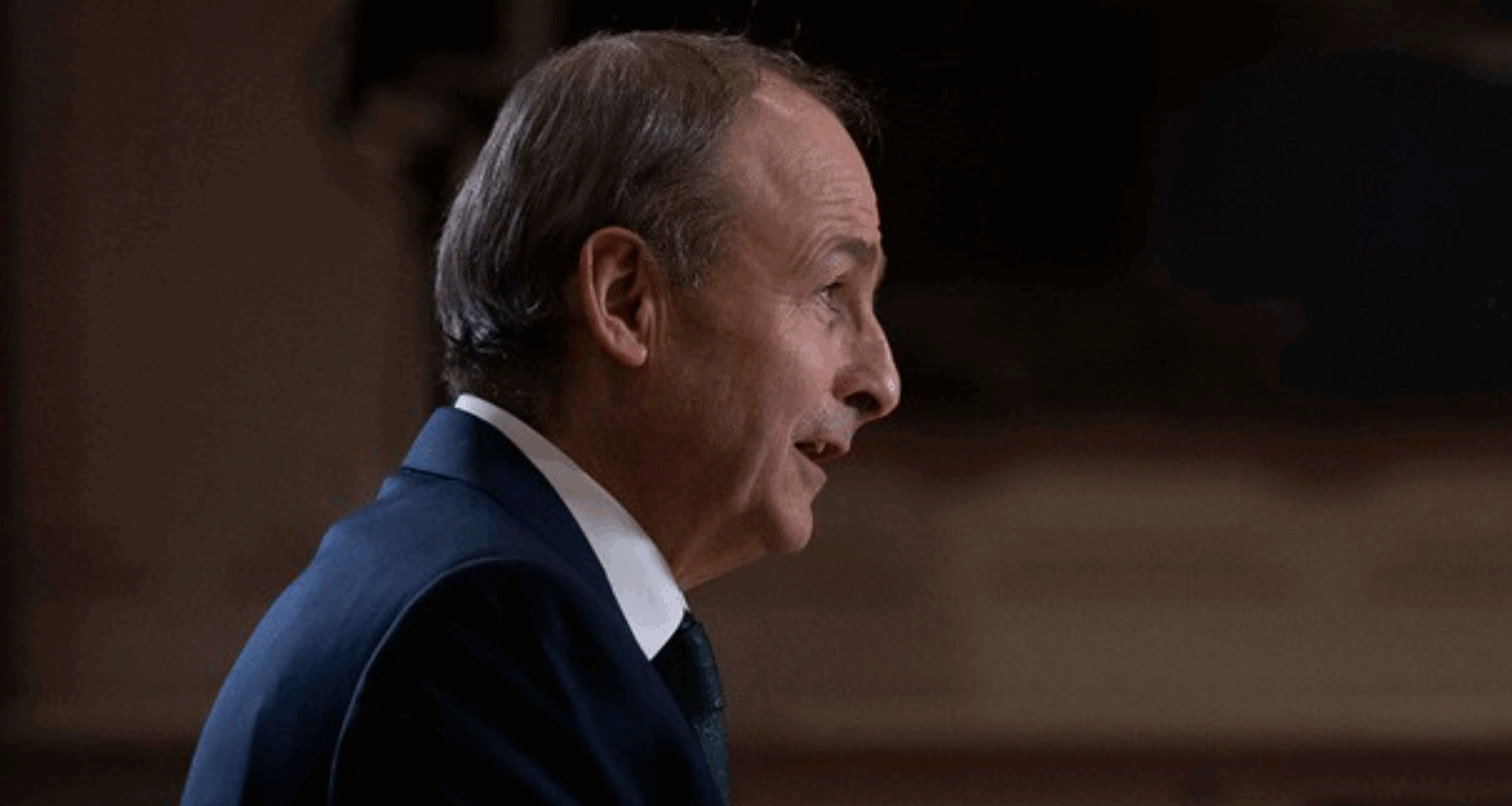“It doesn’t matter what I think, because it is evident and clear the EU and globalist policies will trump the will of the people.”
Those words are from one of hundreds of submissions to a public consultation conducted by the Irish Government regarding thee State’s national “disinformation” strategy.
In September of 2023, the Irish Department of Communications held a consultation on what was then a nascent “National Counter Disinformation Strategy”. At the consultation’s launch, then-Media Minister Catherine Martin said it was “important” to “seek the views of the public”, and explained that “that is the aim of this public consultation.”
She added: “I would encourage people to…submit their views.”
A total of 470 responses were received between September and October 2023, including from journalists and media outlets, academics, “civil society” organisations, Government Departments and state agencies, and the general public. The vast majority of responses (83.6%) were from ordinary members of the general public.
However, Gript has analysed each and every submission individually, and can now confirm that the vast majority of responses were negative towards the Government’s plans, urging them not to go ahead with the strategy at all.
A total of 83% of respondents were opposed to the plan, with just 11% being supportive, 4% having mixed feelings, and 2% being unclear or duplicate responses.
“People aren’t as dumb as you think.”
“Very dystopian.”
“The government should stay out of people’s lives, and stop pushing legislation no one wants or voted on.”
“The state should take no actions to “counter disinformation” because it can’t be trusted to be unbiased.”
“Regulation of the media is already practiced in communist countries. Disinformation is one of those contrived words which is at best ambiguous and can be molded to favour any argument.”
Moreover, of the 11% that were positive, many of these were Government-affiliated groups, such as branches of the State or State-funded NGOs.
Respondents included State agencies such as Coimisiún na Meán, the HSE, the Citizens’ Information Board, Leitrim County Council, OIDE, and Webwise; Government Departments, such as the Department of Foreign Affairs; Leftwing state-funded campaigning NGOs, such as the Hope & Courage Collective; media outlets such as the Journal.ie; and a litany of universities and advocacy groups.
Additionally, 85% of respondents mentioned concerns about the potential impact on free speech or civil rights, including some who were generally supportive of disinformation laws, but who advocated that the Government proceed with caution.
“I am completely opposed to the State regulating mis/disinformation. It’s an example of extreme State overreach and I do not consent to it.”
“Free speech is more important. Disinformation is a term used by institutions and politicians to discredit information and opinions that don’t suit their agenda even when the information is manifestly true.”
“Its not a principle. Its abhorrent and would be abused. Less government please.”
“Educate people rather than putting a dangerous amount of power in the hands of the few.”
“The notion that any state body has the right to decide what is disinformation is laughable. And any state that introduces such measures has delegitimised itself simply by the attempt.”
“It’s too broad and ill defined and could be used to arbitrarily limit the right to freedom of expression.”
“Freedom of speech/expression are a fundamental right and under no circumstances should they be limited by any government regulation or statute…Who defines ‘disinformation’? The last four years have demonstrated that a lot of what some call ‘disinformation’ was actually just information that went against the government narrative. There is no need for any of this. Freedom of expression is a fundamental right that should not be regulated in this manner. This is censorship at is worst. Democratic societies do not need this type of regulation – it is fundamentally at odds with any democracy and should be abandoned immediately.”
Meanwhile, 80% said explicitly that anti-misinformation measures were not needed at all and should be scrapped entirely.
The Department of Communications admitted this in its subsequent report on the consultation, writing:
“While the survey did not pose the question of whether a strategy was required, it was clear from most of the responses from the general public that they did not feel that a strategy was needed. This was also accompanied by a view that the strategy would result in censorship
…A significant number of responses from the general public expressed concern that the strategy could be a way for the Government to curtail freedom of expression or censor views. A subset of these responses cited the controversy around the Criminal Justice (Incitement to Violence or Hatred and Hate Offences) Bill 2022 in the context of freedom of expression. Many of these responses also called for legislation to be stopped, repealed or not to proceed.”
Despite this, the Government proceeded with the Disinformation Strategy anyway, publishing it in April of this year.
In a press release put out by the Department at the time, Communications Minister Patrick O’Donovan “welcomed” the strategy’s launch, saying that he “looks forward to seeing good progress on this strategy.” The press release also mentions that “there was a public consultation…as part of the development process,” but neglects to mention that most of the responses received were overwhelmingly negative.
While the strategy document in question mentions the need to balance rights and protect free expression, the Department of Communications confirmed to Gript that they had done no analysis of any kind into the potential impact of misinformation regulations on freedom of speech.

Moreover, the Government’s Programme for Government published earlier this year mentions the need to combat “misinformation” and “disinformation” a total of nine times.
As previously covered by Gript, the Government also ignored the results of a public consultation they held in 2023 on the Family and Care referendums (which was 92.7% negative and 0.7% positive for individual submissions), and on hate speech legislation (which was 73% negative and 24.1% positive).
Defending this, then-Taoiseach Leo Varadkar told Gript that it was because such consultations are often not representative of public opinion.

